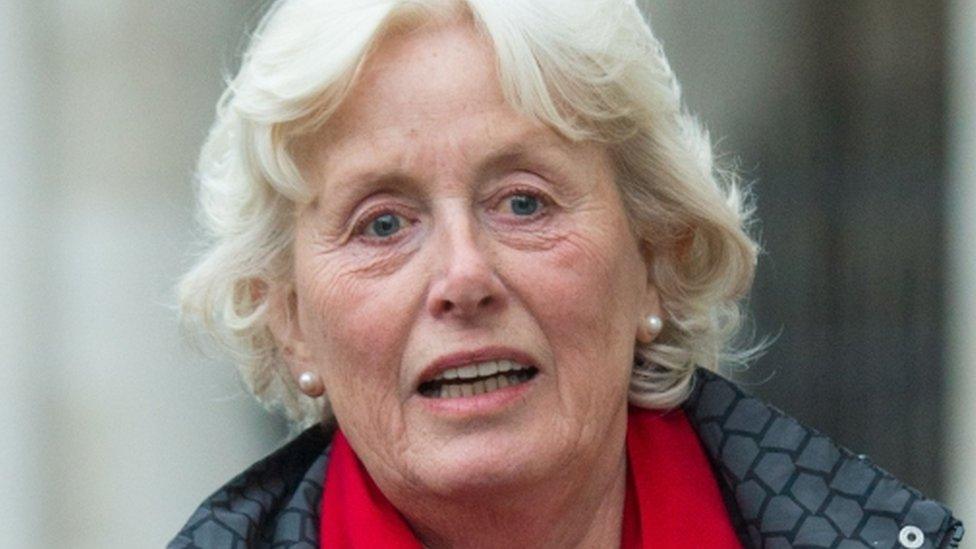Drive for family court transparency a 'limited success'
- Published

Campaigners have described the powerful family courts as secretive and unaccountable in the past
The much publicised drive to open family courts in England and Wales to public scrutiny has had only limited success, according to the first national evaluation, funded by the Nuffield Foundation.
In 2014, the president of the Family Division, Sir James Munby, said judges should publish judgements in their most significant cases and certain care cases.
But in 2014 and 2015, only 837 of these were published, via the legal website the British and Irish Legal Information Institute (BAILII).
There were more than 25,000 care applications in English and Welsh courts during this time, though not all would result in a judgement that could be published.
For many years campaigners have described the powerful family courts as secretive and unaccountable.
The courts have been responsible for some highly controversial decisions, such as that to return Ellie Butler to her father's care, or the decision to take away Karissa Cox and Richard Carter's baby.
Piecemeal impact
Sir James Munby's "transparency initiative" has been widely welcomed, especially by the press. He wrote that it should "bring about an immediate and significant change".
However, the first detailed evaluation carried out by Dr Julie Doughty of Cardiff University and others, including Alice Twaite and Paul Magrath, shows a piecemeal impact.
While some judges and certain courts regularly publish judgements, others do so rarely, if at all. In Newcastle during 2014 and 2015 judges frequently sent cases for publication, as did Leeds, Manchester and East London.
But no judge in Devon, South East Wales or Wolverhampton published cases during that time.
The researchers warn that fewer judgements are being published now than in 2014 and 2015.
"Rather than publication becoming accepted as routine, it appears to be increasingly exceptional," they say.


Judges have to make sure no family involved in a case can be identified when they publish a judgement. This anonymisation can be a complex process.
The researchers found there had been mistakes. One judgement was published with a name left in. Others had details that could identify a family.
Judges told the researchers they lacked resources and time to prepare judgements for publication.
"Even judges who are very enthusiastic about the guidance and who are keen on publishing judgements because they feel that they should be open to accountability and scrutiny, even those judges are struggling to find the time and resources to publish those judgements," says Dr Doughty.
She said it was "unrealistic" to expect all care cases to be available for public scrutiny.
Although many families are often wary of publication, because they're worried they or their children could be identified, some have found it very useful.
Two years ago, we reported a case of a grandmother who wanted to look after her grandson, while the local authority said he should be adopted.
The judge decided the boy should stay with his family. We could report it because the judgement had been posted online.
The grandmother was pleased the judgement had been made public.
"In our case social services did wrong. Publishing the judgement meant they couldn't do it again," she said. "They've had to be more careful since."

Cathy Ashley, chief executive of the Family Rights Group, believes it is important to publish judgements
The Family Rights Group (FRG) is a charity that helps families caught up in the family justice system.
It is currently trying to help another grandmother who wants to keep her grandson, rather than have him adopted.
However in this case, the court decided against her. The grandmother believes she has grounds to appeal, but it's hard to know as this judge did not publish his judgement.
"This grandmother feels that a major injustice has taken place. It looks like that is the case but of course without the published judgement we can't properly evaluate that and of course she's left in this really invidious position," says Cathy Ashley, chief executive of FRG.
The report suggests that instead of publishing as much as possible, each area should publish a few representative cases instead.
Cathy Ashley disagrees. Although she feels the evaluation was "disappointing", especially the "patchiness" of publication, she believes it is still important to publish, as it could build public trust.
Sanchia Berg reports for BBC Radio 4's Today programme.
- Published22 April 2014

- Published23 February 2017

- Published15 February 2017
